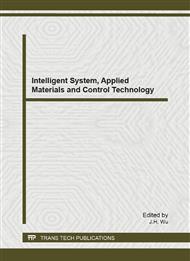p.208
p.217
p.221
p.227
p.232
p.239
p.243
p.247
p.251
Research on Knowledge Base of Device Test Training System Based on Rough Set Data Mining
Abstract:
The realization of a device test training system requires the use of a lot of domain knowledge, and building knowledge base will play an important role. In view of the uncertainty, inaccuracy and incompleteness of test data in the testing process, this paper makes the data mining algorithms based on rough set as knowledge acquisition algorithm, and proposes an improved algorithm for insufficient of approximate reduction of rough set knowledge based on the tolerance relation of incomplete information system. The paper studies the design and realization of knowledge base system in the developing of device simulation training system on this basis, and validates the method through a design example of knowledge base of a certain device simulation training system.
Info:
Periodical:
Pages:
232-238
DOI:
Citation:
Online since:
January 2013
Authors:
Keywords:
Price:
Сopyright:
© 2013 Trans Tech Publications Ltd. All Rights Reserved
Share:
Citation:


